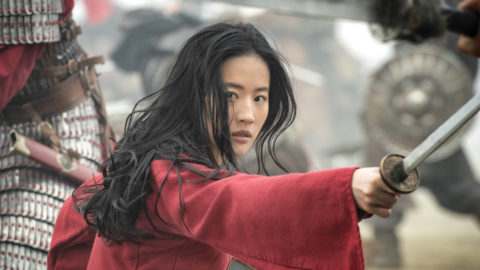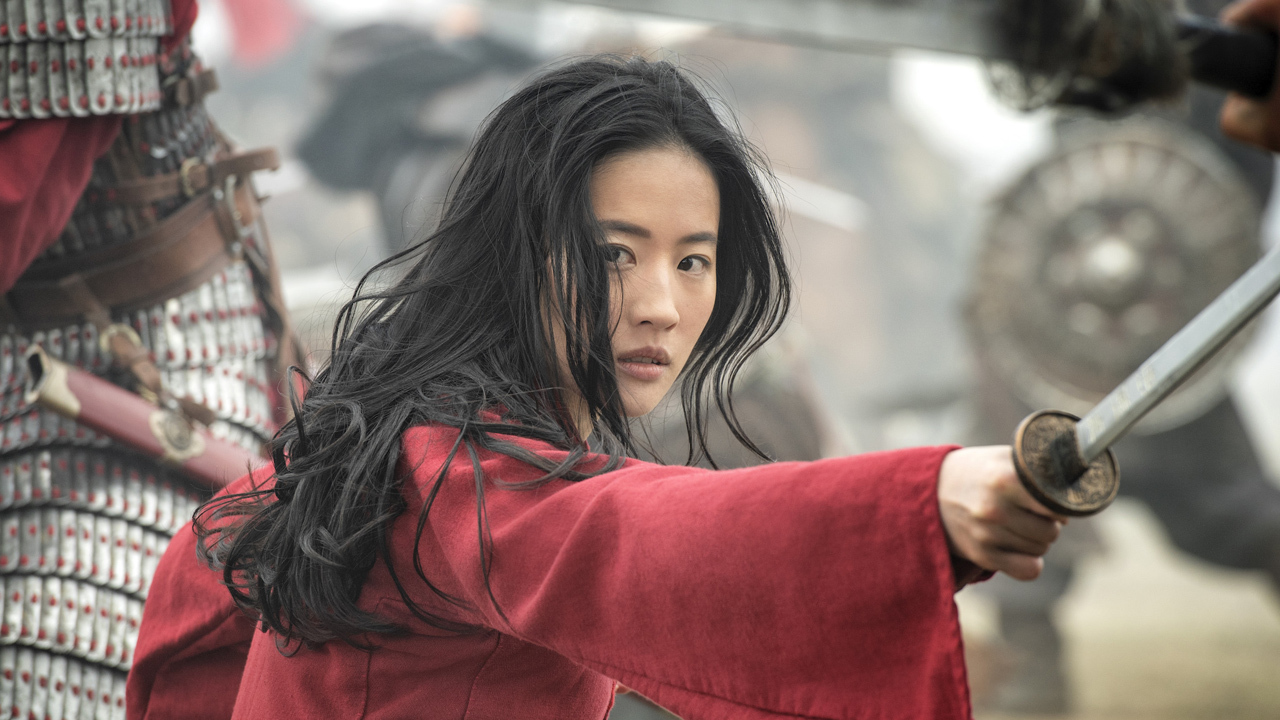Here’s Why #BoycottMulan Is Trending
Seems like everyone is hating on the new live-action 'Mulan'

Disney’s live-action remake of Mulan is *finally* here, and it turns out the popular movie really wasn’t worth the wait. On September 4, shortly after the release of the highly anticipated film on Disney+, #BoycottMulan began trending on Twitter, linked to tweets from several Hong Kong-based human rights activists. The movie, which had been delayed due to the COVID-19 pandemic, was causing a stir—and not for a very good reason—with many people online and IRL calling out the film and its lead actor, Liu Yifei, for supporting the Chinese government and Hong Kong police for alleged mistreatment of citizens. Here, everything you need to know about the controversy surrounding Disney’s live-action remake of Mulan.
#BoycottMulan is a response to comments made by Liu Yifei
While #BoycottMulan began trending in September 2020, the sentiment behind it really originated in August 2019 when Liu Yifei made some extremely controversial comments in support of the Hong Kong police on Weibo, a Chinese social media website. “I also support Hong Kong police. You can beat me up now,” the actor—who was born in China but holds American citizenship—reportedly wrote in Mandarin. “What a shame for Hong Kong.”
ICYMI, in June 2019, pro-democracy demonstrators began protesting in Hong Kong, speaking out in opposition to a then-planned bill that would have allowed the extradition of criminal suspects from Hong Kong to mainland China. This proposed bill was problematic for many people in Hong Kong, as critics felt the extradition amendment would “would significantly compromise the territory’s legal independence,” according to CTV, as well as endanger those who opposed the Chinese government. (While Hong Kong is still a Chinese territory, due to historical decisions, it enjoys a unique amount of autonomy and has its own legal system and borders, rights like the freedom of assembly, and protection of free speech and freedom of the press.) The protests quickly became violent, with Hong Kong police using what many believe was excessive force and police brutality to quell the protests, which has been viewed as a human rights violation.
Yifei’s support of the police was in response to these protests.
In a February 2020 interview with The Hollywood Reporter, Yifei addressed her previous comments, telling the magazine: “It’s obviously a very complicated situation, and I’m not an expert,” adding “I just really hope this gets resolved soon…I think it’s just a very sensitive situation.”
With the recent release of the film, Yifei’s comments were back in the spotlight, with pro-democracy activist Joshua Wong urging people to refrain from seeing the movie, tweeting: “This film is released today. But because Disney kowtows to Beijing, and because Liu Yifei openly and proudly endorses police brutality in Hong Kong, I urge everyone who believes in human rights to #BoycottMulan.”
This film is released today. But because Disney kowtows to Beijing, and because Liu Yifei openly and proudly endorses police brutality in Hong Kong, I urge everyone who believes in human rights to #BoycottMulan. https://t.co/utmP1tIWNa
— Joshua Wong 黃之鋒 😷 (@joshuawongcf) September 4, 2020
But the movie itself is also problematic
In addition to Yifei’s comments, calls to boycott the film have also arisen due to the film itself—and where filmmakers chose to shoot and credit within China. As many people online pointed out, several scenes in the film subtitled as “Northwest China” were filmed in the Xinjiang province of China. While that seems like a non-issue on the surface for people who aren’t familiar with the country, in actuality it’s a pretty problematic move, because this is a region that has been accused of mass human rights abuses. According to the BBC, it is believed that around 1 million people—the majority of whom are Muslim Uighurs—are being detained by the Chinese government in camps in this region.
Mulan specifically thank the publicity department of CPC Xinjiang uyghur autonomous region committee in the credits.
You know, the place where the cultural genocide is happening.
They filmed extensively in Xinjiang, which the subtitles call “Northwest China”#BoycottMulan pic.twitter.com/mba3oMYDvV
— Jeannette Ng 吳志麗 (@jeannette_ng) September 7, 2020
Specifically, people noted that the public security bureau in the city of Turpan was thanked in Mulan’s end credits. According to China expert Adrian Zenz—who spoke to the BBC—this bureau is tasked with running the country’s “re-education” camps—centres that have been accused of locking up and brainwashing Muslim citizens against their will. At a December 2019 news conference in Beijing, Shohrat Zakir, the chairman of the Xinjiang government, dismissed claims that people were being held against their will, according to The New York Times, saying that the facilities (which Beijing has reportedly called vocational centres) are now only holding people who are there voluntarily.
And also, apparently it just isn’t that great
And on top of it all—apparently the movie just isn’t that good on a cinematic level. While there’s no denying that the film is monumental for representation (it’s always important to bring more diverse and representative stories and faces to Hollywood), it also leaves a lot to be desired—and fans have known that from the onset. Since the film was announced in August 2018, the movie has faced *a lot* of setbacks. Aside from the change in release date (the film was initially set for a November 2, 2018 release date, before being pushed back to March 27, 2020 and then the beginning of September, thanks to the COVID-19 pandemic), the film also made some serious missteps when it came to who was behind the scenes, with a nearly all-white production team, including the director, writers and costume designer. And as FLARE writer Blythe Hunter pointed out in a March 11 article, the ignorance of the film’s staff was super evident, with costume designer Bina Daigeler telling reporters that her research included going to European museums that had “Chinese departments” and travelling to China for a total of three weeks to prepare. As Hunter wrote, here was “yet another example of Westerners ~studying~ a different culture or part of the world and then talking like they’re experts.”
And perhaps that ignorance has trickled down into the film itself. Initial reviews online from fans and film critics both pointed out the historical inaccuracy of the characters:
https://twitter.com/Confannie/status/1302440748168613888
As well as decried the fact that the movie just doesn’t stand up to the 1998 animated version. (Along with removing the characters of Li Shang and Mushu, they reportedly removed the iconic song “I’ll Make a Man Out of You,” which is in itself should be a crime. Honestly, how dare they?! This movie needs the music!) Oh, plus, to stream at home viewers have to pay $35 in addition to their Disney+ membership fee—so there’s that, too.
Sorry, Disney, but this is one live-action remake we’re going to have to pass on.









